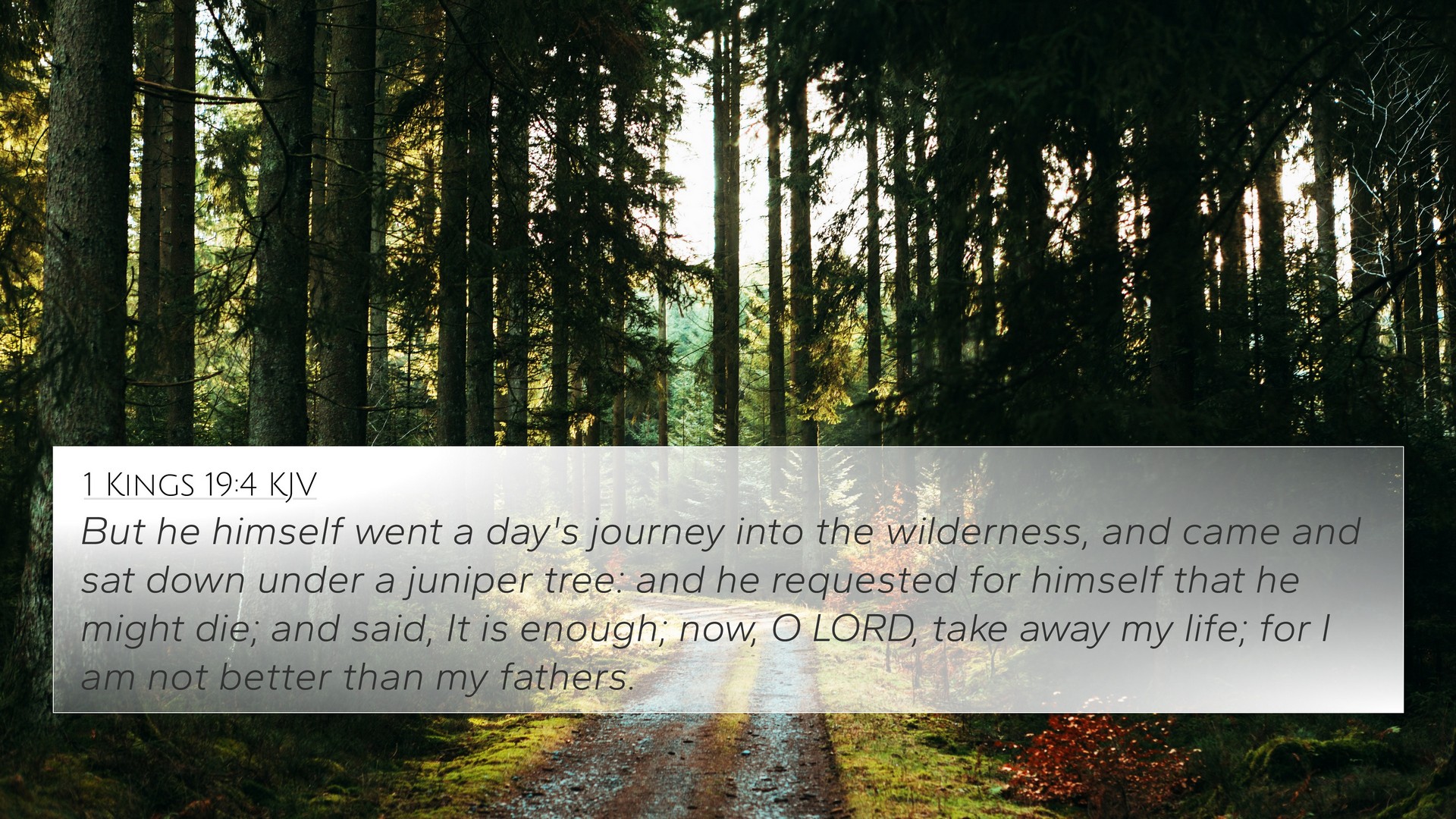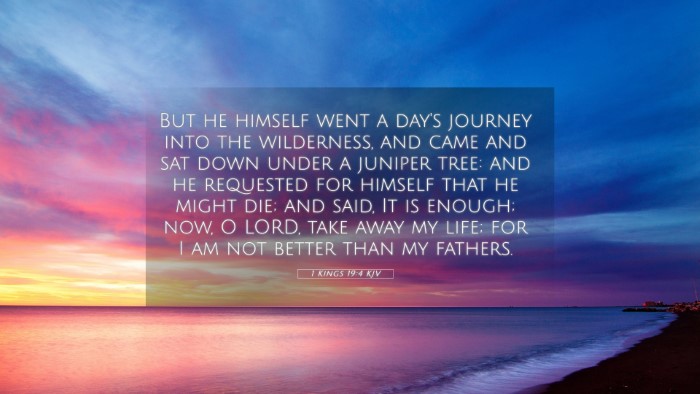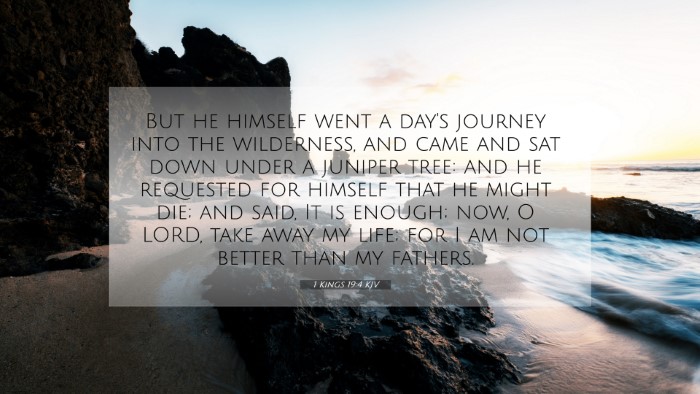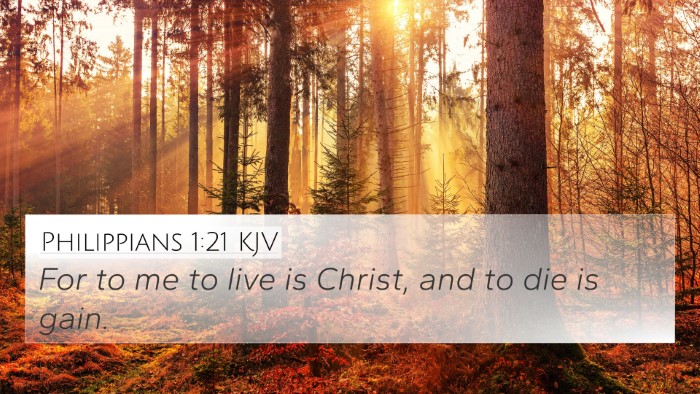Old Testament
Genesis Exodus Leviticus Numbers Deuteronomy Joshua Judges Ruth 1 Samuel 2 Samuel 1 Kings 2 Kings 1 Chronicles 2 Chronicles Ezra Nehemiah Esther Job Psalms Proverbs Ecclesiastes Song of Solomon Isaiah Jeremiah Lamentations Ezekiel Daniel Hosea Joel Amos Obadiah Jonah Micah Nahum Habakkuk Zephaniah Haggai Zechariah Malachi1 Kings 19:4 Similar Verses
1 Kings 19:4 Cross References
But he himself went a day's journey into the wilderness, and came and sat down under a juniper tree: and he requested for himself that he might die; and said, It is enough; now, O LORD, take away my life; for I am not better than my fathers.
Uncover the Rich Themes and Topics of This Bible Verse
Listed below are the Bible themes associated with 1 Kings 19:4. We invite you to explore each theme to gain deeper insights into the Scriptures.
1 Kings 19:4 Cross Reference Verses
This section features a detailed cross-reference designed to enrich your understanding of the Scriptures. Below, you will find carefully selected verses that echo the themes and teachings related to 1 Kings 19:4 KJV. Click on any image to explore detailed analyses of related Bible verses and uncover deeper theological insights.
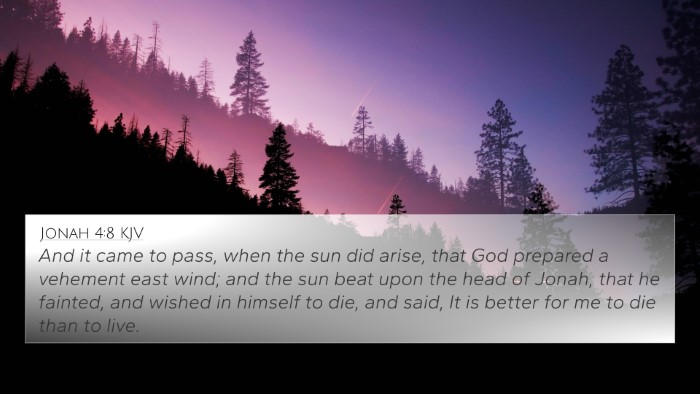
Jonah 4:8 (KJV) »
And it came to pass, when the sun did arise, that God prepared a vehement east wind; and the sun beat upon the head of Jonah, that he fainted, and wished in himself to die, and said, It is better for me to die than to live.
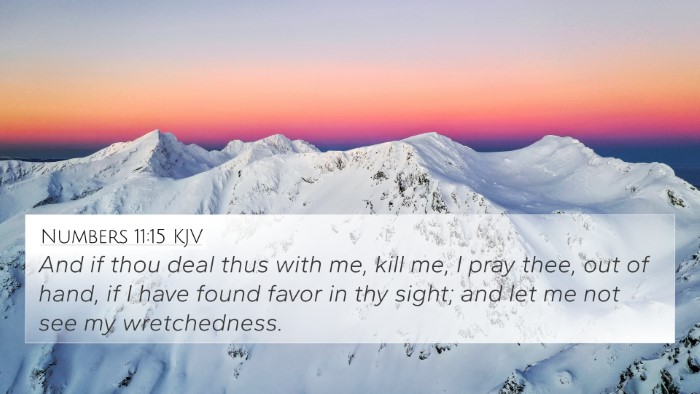
Numbers 11:15 (KJV) »
And if thou deal thus with me, kill me, I pray thee, out of hand, if I have found favor in thy sight; and let me not see my wretchedness.
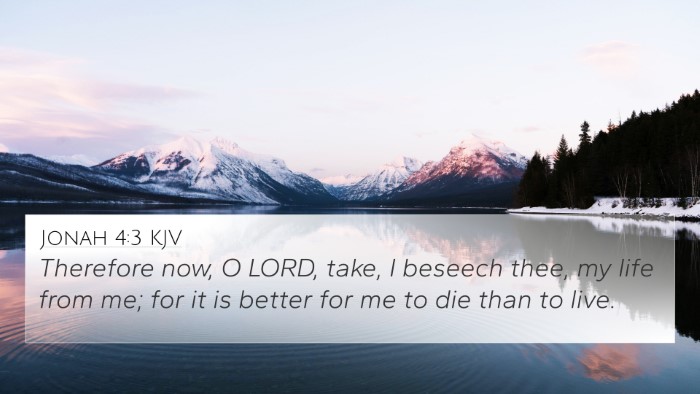
Jonah 4:3 (KJV) »
Therefore now, O LORD, take, I beseech thee, my life from me; for it is better for me to die than to live.
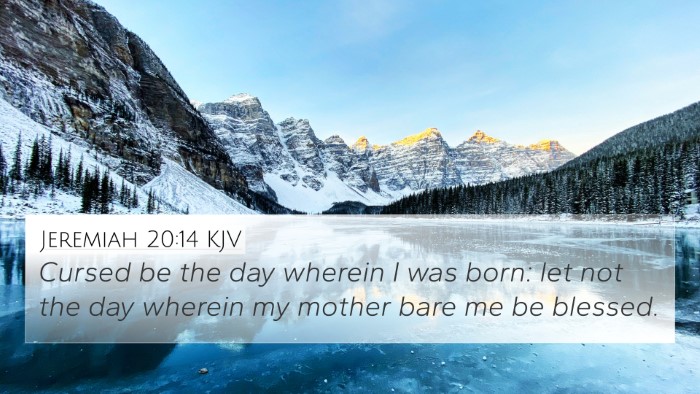
Jeremiah 20:14 (KJV) »
Cursed be the day wherein I was born: let not the day wherein my mother bare me be blessed.
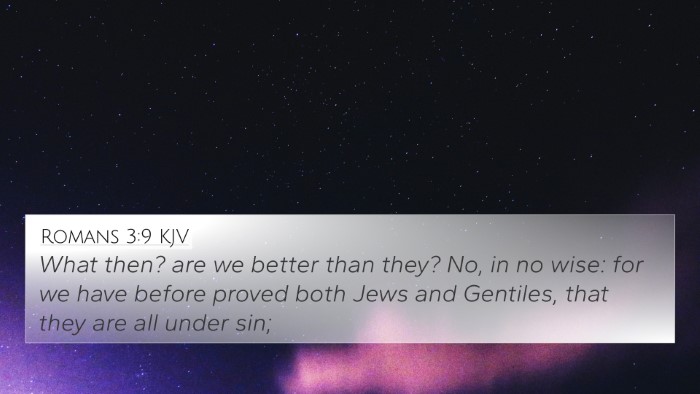
Romans 3:9 (KJV) »
What then? are we better than they? No, in no wise: for we have before proved both Jews and Gentiles, that they are all under sin;
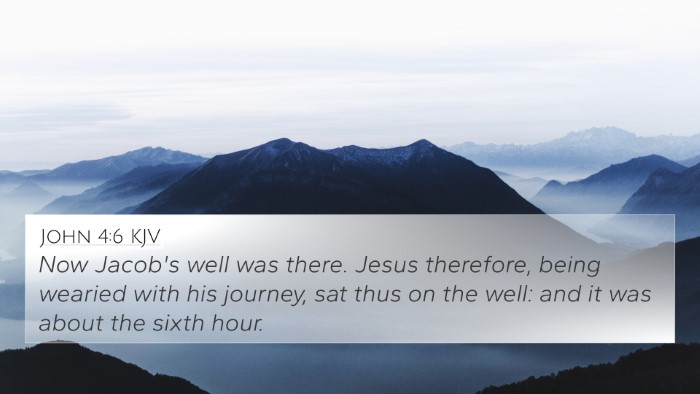
John 4:6 (KJV) »
Now Jacob's well was there. Jesus therefore, being wearied with his journey, sat thus on the well: and it was about the sixth hour.
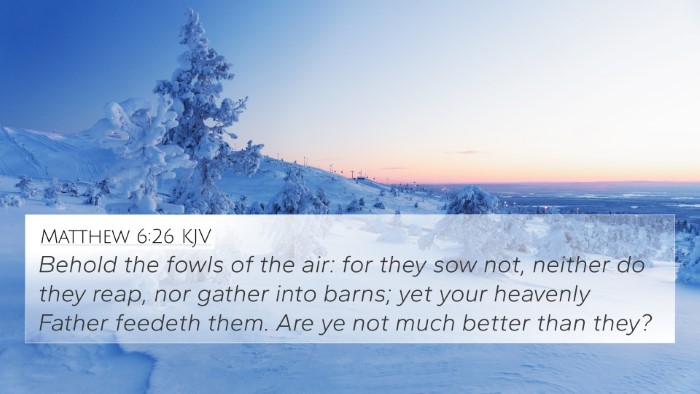
Matthew 6:26 (KJV) »
Behold the fowls of the air: for they sow not, neither do they reap, nor gather into barns; yet your heavenly Father feedeth them. Are ye not much better than they?
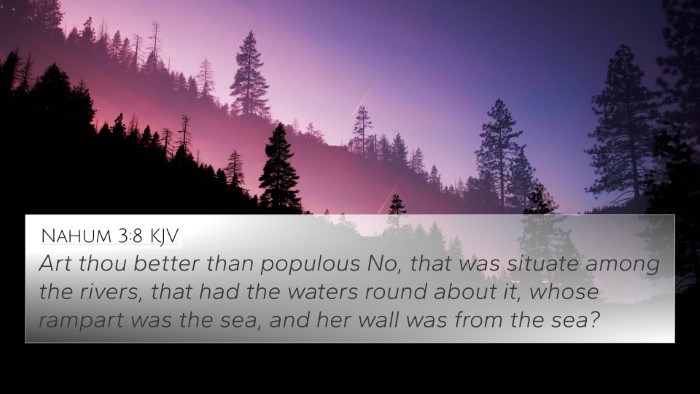
Nahum 3:8 (KJV) »
Art thou better than populous No, that was situate among the rivers, that had the waters round about it, whose rampart was the sea, and her wall was from the sea?
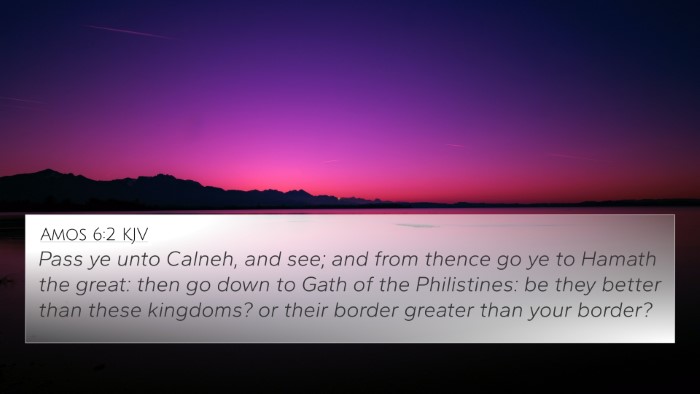
Amos 6:2 (KJV) »
Pass ye unto Calneh, and see; and from thence go ye to Hamath the great: then go down to Gath of the Philistines: be they better than these kingdoms? or their border greater than your border?
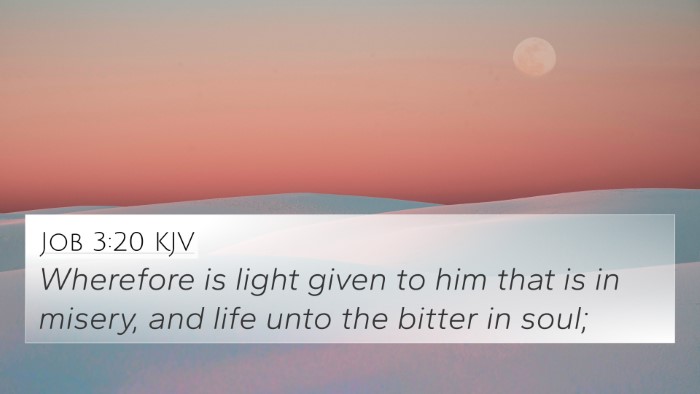
Job 3:20 (KJV) »
Wherefore is light given to him that is in misery, and life unto the bitter in soul;
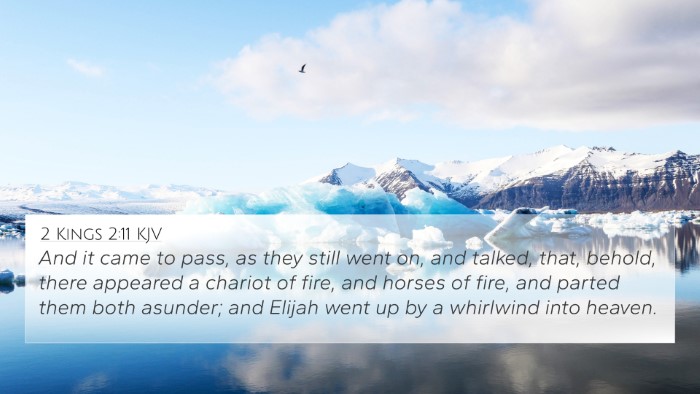
2 Kings 2:11 (KJV) »
And it came to pass, as they still went on, and talked, that, behold, there appeared a chariot of fire, and horses of fire, and parted them both asunder; and Elijah went up by a whirlwind into heaven.
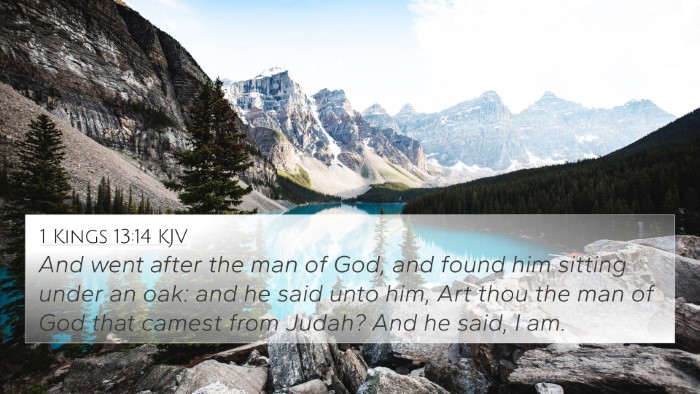
1 Kings 13:14 (KJV) »
And went after the man of God, and found him sitting under an oak: and he said unto him, Art thou the man of God that camest from Judah? And he said, I am.
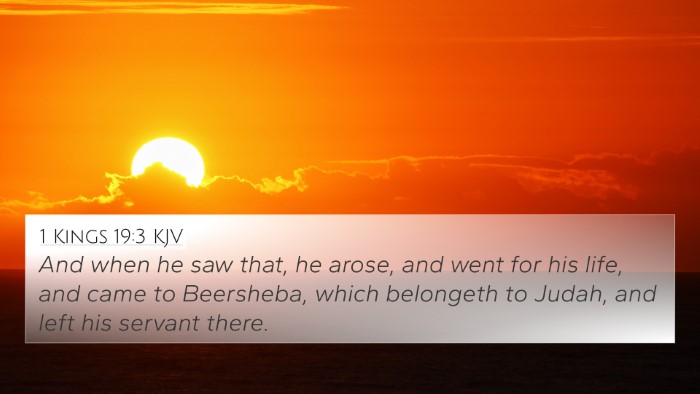
1 Kings 19:3 (KJV) »
And when he saw that, he arose, and went for his life, and came to Beersheba, which belongeth to Judah, and left his servant there.
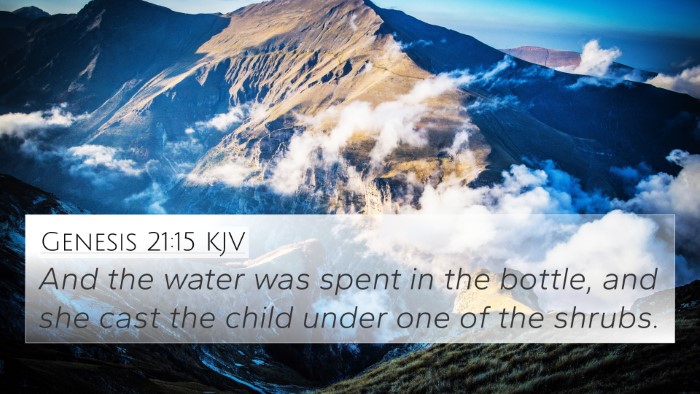
Genesis 21:15 (KJV) »
And the water was spent in the bottle, and she cast the child under one of the shrubs.
1 Kings 19:4 Verse Analysis and Similar Verses
Understanding 1 Kings 19:4
Bible Verse: 1 Kings 19:4
"But he himself went a day's journey into the wilderness, and came and sat down under a juniper tree: and he requested for himself that he might die; and said, It is enough; now, O Lord, take away my life; for I am not better than my fathers."
Summary of Meaning
This verse captures a profound moment in the life of the prophet Elijah, reflecting his despair and sense of hopelessness. After a significant victory against the prophets of Baal, Elijah finds himself in a state of fear and exhaustion, illustrating the human experience of discouragement, even after success.
Commentary Insights
-
Matthew Henry's Commentary:
Henry emphasizes Elijah's flight from Jezebel after her threats. He notes that even great prophets like Elijah can fall into deep despair. His request for death highlights his overwhelming sense of failure and exhaustion, which serves as a reminder that spiritual leaders can also experience moments of vulnerability and doubt.
-
Albert Barnes' Commentary:
Barnes discusses the context of Elijah's ministry and the pressures he faced. He points out that the wilderness symbolizes isolation and despair, suggesting that Elijah's experience is relatable to anyone who has faced discouragement. His plea represents a desire for relief from suffering rather than a true wish for death.
-
Adam Clarke's Commentary:
Clarke highlights Elijah's emotional state, stressing the intensity of his mental and spiritual battle. He explains that Elijah, feeling alone in his struggle, sought solace in death, indicating a deep sense of isolation. This plea for God to take his life can be seen as a moment of surrender to God’s will amidst health challenges.
Cross-References
1 Kings 19:4 connects deeply with several other scriptures that share similar themes of despair, divine interaction, or prophetic challenges:
- Job 3:11-12: Job expresses a desire to have never been born, similar to Elijah's despair.
- Psalm 42:5: The psalmist questions why he is downcast, reflecting a common experience of spiritual discouragement.
- Jeremiah 20:14-18: The prophet Jeremiah laments his life and calls for curses upon the day he was born, resonating with Elijah's feelings.
- Matthew 26:38: Jesus expresses sorrow unto death in the Garden of Gethsemane, paralleling Elijah's struggle.
- 1 Kings 17:1: Earlier, Elijah boldly proclaims God's judgment, showcasing the sharp contrast with his current state of despair.
- Luke 9:28-32: The transfiguration offers a glimpse of God’s glory, reminding that even in despair, God's purpose prevails.
- Philippians 4:6-7: Paul encourages prayer in times of anxiety, contrasting with Elijah's request for death.
- Isaiah 40:30-31: This passage offers hope and renewal for those who wait upon the Lord, applicable to Elijah’s situation.
- Romans 8:28: Even in despair, God's plan comes together for good, contrasting with the moment of hopelessness experienced by Elijah.
- 2 Corinthians 1:8-10: Paul discusses his own hardships, similarly illustrating the difficulties faced by God’s servants.
Thematic Connections
This verse sits at the intersection of several important biblical themes such as:
- Despair and Hope: The struggles of God’s prophets provide a lens to explore despair, yet are often met with divine reassurance.
- Isolation: Elijah’s solitude in the wilderness echoes the experience of many biblical figures who faced God alone.
- Crisis of Faith: Moments when faithful servants question their worth and purpose are reflected throughout scripture.
- Divine Intervention: God’s responses to human despair illustrate His continual presence in our darkest moments.
Tools for Cross-Referencing
When studying 1 Kings 19:4, various tools can enhance understanding:
- Bible Concordance: A useful tool for finding related verses through thematic connections.
- Bible Cross-Reference Guide: Helps identify verses that correlate with each other, deepening understanding.
- Cross-Reference Bible Study: Methods for exploring thematic continuity through scripture.
- Bible Reference Resources: Useful for comprehensive studies of biblical themes and narrative parallels.
Conclusion
1 Kings 19:4 serves as a poignant reminder of the struggles faced by even the most faithful servants of God. Through cross-referencing with other biblical texts, one can gain deeper insights into the emotional and spiritual battles encountered in life. By studying these connections, believers can glean encouragement and hope for their own challenges.
